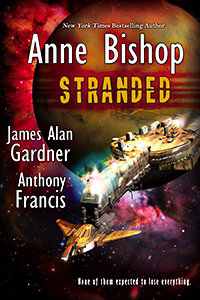Stranded by Anne Bishop (ed.)
 Monday, August 27, 2012 at 9:34AM
Monday, August 27, 2012 at 9:34AM 
Published by Bell Bridge Books on August 24, 2012
Stranded brings together three lengthy science fiction stories, all written for this volume, that share the titular theme: stories about being stranded. Each is preceded by a short introduction written by the story's author.
James Alan Gardner wrote "A Host of Leeches." Alyssa Magord, the victim of an alien plague, wakes up alone -- alone except for a hybrid computer/dolphin that shares her blood and a variety of weaponized robots. She soon realizes she's in quarantine ... the kind of quarantine from which it may be impossible to return. While this is a promising premise, the story descends into silliness as the robots squabble with each other. The story isn't quite funny enough to succeed as laugh-out-loud comedy, although I assume that was the author's intent. It has its moments, and the ultimate resolution is moderately clever.
Anne Bishop wrote "A Strand in the Web." Willow lives on city-ship that travels around the galaxy. The crew's mission (which carries quasi-religious overtones) is the restoration of devastated worlds (sort of like playing SimPlanet). Although she is merely a student, Willow mysteriously becomes responsible for restoring an entire island. Apart from an unfortunate bit of silliness involving unicorns, the story becomes interesting when it focuses on the restoration work, the careful balancing of plants and birds and bees, predators and prey. On the other hand, Willow's triumphant development as a character and the story's conclusion are predictable and dull.
Anthony Francis wrote "Stranded." For no apparent reason, the girls are at war with the boys in a ship that is falling apart, and it's up to a "Halfway Boy" named Sirius to save them all. Now, with the ship in distress, they must land on an uncharted planet. Add an elf-monkey child (seriously?) and a centaur (seriously?) who carries a staff that lets her "skip from world to world" (seriously?) and you've got what amounts to a fantasy married to cheesy science fiction. The story reads like it was written in the Flash Gordon era (the nastiest weapon the humans can muster is a "blaster"). The writing style is cliché-dependent and overwrought, relying too amply on exclamation points!!! to signal conflict and create drama. The plot is preachy (and rather stale in its condemnation of patriarchy and homophobia), often more soap opera than space opera, but the last third of the story introduces some interesting concepts.
RECOMMENDED WITH RESERVATIONS